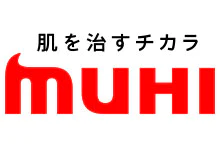History of IKEDA MOHANDO
1909 to 1944
IKEDA MOHANDO started selling household medicines left by sales person and paid for when used. Transformation from a wholesaler to a manufacturer.
Commenced production of MUHI (meaning “Incomparable” in Japanese). Aiming for a unique, unparalleled drug.
- 1909
- Kaichiro Ikeda founded a home placement medicine sales business

- 1913
- First President Kakichi Ikeda engaged in the sale of household medicines.

- 1914
- The company was named IKEDA MOHANDO.
- 1926
- Started manufacturing MUHI. Muhi, a canned petroleum jelly ointment was released for the first time.
- 1927
- Muhi in a tube was launched.
- 1931
- A new white cream formulation, MUHI, was launched, and it was an explosive success.
- 1933
- A new factory was built in Kaminaka-machi, Kamiichi-machi, Toyama Prefecture (3-story building, 595 ㎡).

1945 to 1964 Established the MUHI brand through a persistent advertising strategy in newspapers and television in the early days of its popularization.
- 1947
- Established distributors in Tokyo, Osaka, and Nagoya and began selling MUHI at pharmacies.
- 1948
- IKEDA MOHANDO was reorganized into a joint stock corporation with capital 0.5 million yen.
- 1957
- Head office and factory were relocated to Yokohoonji in Kamiichi-machi.


- 1958
- Their Majesties, the Emperor and Empress, honored the National Sports Festival in Toyama and visited us.
- 1962
- Commenced exporting MUHI to Hong Kong and Macau. MOPIKO became such a big hit that copy products appeared on the market.
- 1963
- Commenced exporting MUHI to Singapore and Malaysia
1965 to 1988 Liquid MUHI was released as the top sales product in the insect bite market in Japan.
- 1965
- Prince Takamatsu visited us.
- 1966
- Established the industry's first quality assurance period
- 1973
- Completed construction of the Tokyo Branch Office
- 1974
- Completed construction of the Osaka Branch Office
- 1975
- Implemented a two-days off per week system
- 1976
-
Completed construction of the factory compliant to Good Manufacturing Practice (GMP, manufacturing and quality control standards for pharmaceuticals)
Japanese GMP guidelines are not only a method of keeping the quality and safety of medicine but also essential standards that medicine manufacturing enterprises have to comply with. These guidelines touch mostly all aspects of our manufacturing process, from the structure of our factory and manufacturing equipment to the management of raw materials and education for employees, etc. We are in compliance with GMP to manufacture and supply our all products with leading-edge equipment, manufacturing methods and strict management of quality.



- 1979
- Completed construction of the Nagoya and Fukuoka Branch Offices
1989 to 2007 Anpanman character was used for the first time on pharmaceutical packaging.
- 1990
- Relocated Research Laboratory to newly built premises in Jinden, Kamiichi-machi
Increased capital to 56.16 million yen
The first product in the industry to use the Anpanman character, MUHI Patch, the first Anpanman series, was launched.
- 1995
- Completed the construction of the distribution center.
- 1996
- Increased capital to 95.16 million yen
- 2002
- Relocated the Head Office and factory to newly built premises in Shinden, Kamiichi-machi.


- 2005
- Renovated the Tokyo Branch Office
- 2007
- Sales exceeded 10 billion yen
2008 to 2018 Renewed the Corporate Identity (CI). Company logo was changed from ムヒ (katakana) to MUHI.
- 2009
- Built new warehouse for hazardous materials on the head office premises.
- 2010
- Renewed the Corporate Identity (CI).

- 2012
- Relocated the Nagoya Branch Office to newly built premises
50th anniversary of export to Hong Kong

- 2014
- New establishment of the Sendai Branch Office
Completed construction of the MUHI SKIN RESEARCH CENTER, the headquarters R&D building (4-story steel framed building, total construction cost 2.3 billion yen)


- 2016
- Completed construction of the second factory (four-story steel framed building, total construction cost 8 billion yen)


- 2017
- Commenced exporting MUHI to Taiwan
2019 to current From a small to medium-sized company to a medium-sized company. Promoting research and development of first-class products that solve skin problems.
- 2019
- Relocated the Osaka Branch Office to newly built premises.
- 2021
- Relocated the Fukuoka Branch Office to newly built premises.
- 2023
- Started outsourced logistics operations with Otsuka Warehouse Co., Ltd., to ensure a stable supply of pharmaceutical products.